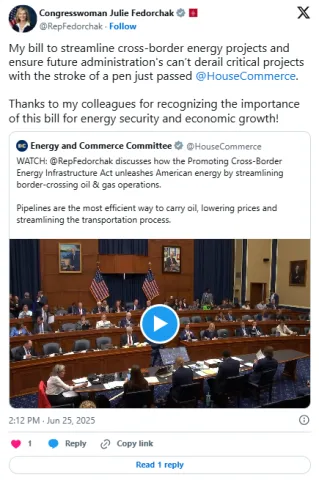Fedorchak bill to streamline cross-border energy projects passes Energy and Commerce Committee, heads to full House
Washington, D.C. – The House Energy and Commerce Committee today advanced Congresswoman Julie Fedorchak’s (R-ND) Promoting Cross-Border Energy Infrastructure Act, which now heads to the full House for consideration. The bill enhances North American energy collaboration by streamlining the permitting process for projects that connect U.S. energy resources with international markets.
“Energy developers deserve certainty—not delays and politics,” Fedorchak said. “The Biden administration’s cancellation of the Keystone XL pipeline cost North Dakota jobs and economic opportunity. This bill puts a clear, reliable process in place so developers can move forward with confidence and so future presidents can’t derail critical energy infrastructure with the stroke of a pen. I’m grateful to my colleagues for recognizing the importance of this bill to American energy security and economic growth and look forward to having it up for a vote on the House Floor soon.”

Background on the Promoting Cross-Border Energy Infrastructure Act:
Under current law, the permitting process for cross-border oil, gas, and electricity projects involves a mix of presidential permits, agency-specific procedures, and executive discretion, which has led to regulatory uncertainty, project delays, and in some cases, permit revocations—such as the Keystone XL pipeline.
The Promoting Cross-Border Energy Infrastructure Act addresses these challenges by establishing a streamlined and transparent approach for the approval of facilities managing the import and export of oil, natural gas, and electricity transmission.
Key aspects of the bill include:
Certificate of Crossing: Presidential permitting has been politicized and arbitrarily applied, as evidenced by the Biden administration’s mistreatment of the Keystone XL pipeline. Under this bill, anyone constructing, connecting, operating, or maintaining a border-crossing facility for the import or export of oil, natural gas, or electricity between the U.S. and Canada or Mexico would be able to obtain a streamlined Certificate of Crossing through either FERC or DOE, rather than through the State Department and President.
Agency Oversight: The Federal Energy Regulatory Commission (FERC) will oversee applications for oil and natural gas pipelines, while the Department of Energy (DOE) will manage applications for electric transmission facilities.
Deadline Compliance: FERC and DOE are required to meet specific deadlines for issuing certificates and approving applications for oil, natural gas, and electricity importation or exportation.
Congressional Approval Requirement: Requires the President to receive Congressional approval before revoking any previously issued permits under executive orders related to the construction, connection, operation, or maintenance of oil or natural gas pipelines, electric transmission facilities, or any other border-crossing energy infrastructure.
By creating a consistent statutory framework, the bill provides regulatory certainty for energy developers, protects critical infrastructure from political reversals, and strengthens the United States’ energy partnerships with Canada and Mexico. The legislation has been introduced in previous Congresses, including in the 115th Congress where the bill passed the House with bipartisan support.
###